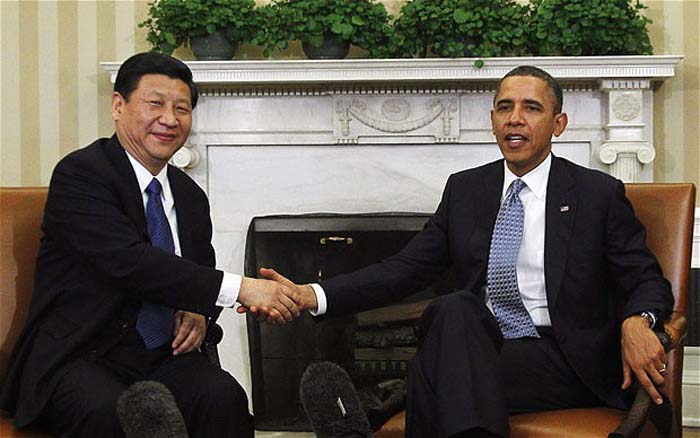 Washington: - During a meeting with Chinese Vice President Xi Jinping, Barack Obama mentioned China's human rights record while pro-Tibetan and pro-Uyghur protesters gathered outside of the White House.
Washington: - During a meeting with Chinese Vice President Xi Jinping, Barack Obama mentioned China's human rights record while pro-Tibetan and pro-Uyghur protesters gathered outside of the White House.
During the meeting, Obama not only told to Xi that China must follow the same trade rules as all other world powers, but vowed to pressure China to improve its human rights record. "On critical issues like human rights we will continue to emphasize what we believe is the importance of recognizing the aspirations and rights of all people," Obama said.Jay Carney, White House Press Secretary, has confirmed that, in the meeting, Obama mentioned specific human rights abuses inside of China. However, no information has been released as to which specific issues were discussed.
In addition to the issue of human rights, Obama told Xi that, though he welcomed China's "peaceful rise," he indicated that tensions will remain as long as the economic and military rivalry continues. He also expressed his disappointment in China's resistance to UN action on Syria.
Xi, who will assume the Chinese Presidency in March 2013, responded by saying that he is interested in building a "cooperative partnership based on respect."
US Vice President Joe Biden and Secretary of State Hillary Clinton also had a "candid exchange" with Xi about human rights abuses by the Chinese Government in Tibet.
To this Xi responded that "China has made tremendous and well-recognised achievements in the field of human rights over the past 30-plus years, since reform and opening up,"
"Of course, there is always room for improvement when it comes to human rights," Xi mentioned, echoing a similar statement made by Chinese President Hu Jintao during a visit to Washington in 2011.
He did not directly address any of Obama's criticism, but later cautioned U.S. leadership that addressing topics like Taiwan and Tibet would only cause "further disturbance and damage" to their countries' relationship.
While the meeting was occurring, a number of protesters gathered outside of the White House and waved the flags of Tibet and the Uyghur autonomous region. The protesters' signs bore statements like: "Xi Jinping: Tibet will be free!" and "Tibet is not a part of China!"
Protesters believed that the meeting was a critical moment in which Obama could address human rights abuses inside of Tibet and the Uyghur autonomous region.
Tenzin Dorjee, the Executive Director of Students for a Free Tibet stated that, "we are here to amplify [Tibetan] voices and to send a message to President Obama that he should use this opportunity to raise the issue of Tibet strongly and vigorously with Xi Jinping ... and in fact as leader of this free and democratic country he should use his influence and authority to impress upon Xi that so long as Tibet remains oppressed and occupied the Chinese government will never truly be accepted by the international community."
Many of Obama's critics have used this opportunity to criticize his "conciliatory attitude" towards China. "Responsible nations must be committed to confronting the Chinese regime on its dark human rights record," said Ileana Ros-Lehtinen, the Republican chair of the House Foreign Relations Committee, who accused Obama of "one dangerous concession after another" to China. Republican Presidential candidate Mitt Romney called Obama's meeting with Xi "empty pomp and ceremony."
Much of what is being said regarding the meeting between Obama and Xi, including what occurred during the meeting itself, comes during an American election year. As a consequence, it is difficult to say how much of it is generated by sincere concern over human rights abuses and how much of it is generated by a need for American politicians to demonstrate that they are capable of pressuring China, who is considered to be The U.S.'s number one rival in the world.


![Tibet has a rich history as a sovereign nation until the 1950s when it was invaded by China. [Photo: File]](/images/stories/Pics-2024/March/Tibet-Nation-1940s.jpg#joomlaImage://local-images/stories/Pics-2024/March/Tibet-Nation-1940s.jpg?width=1489&height=878)















